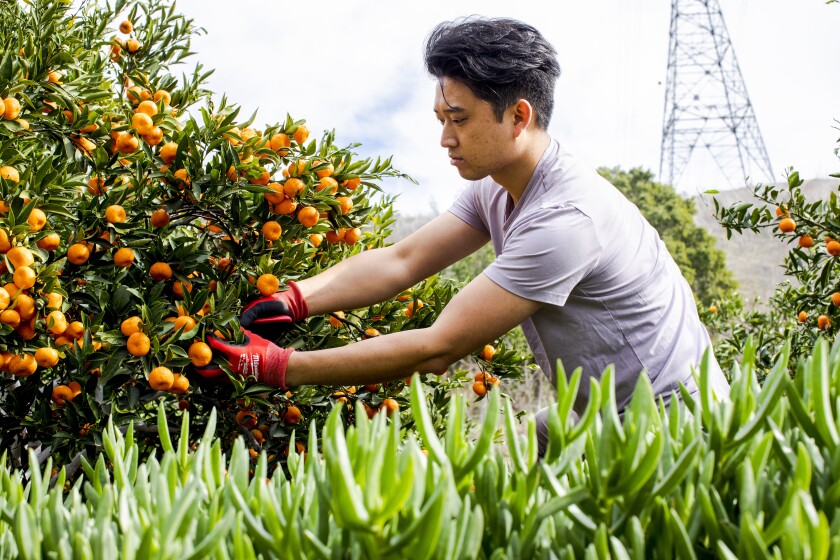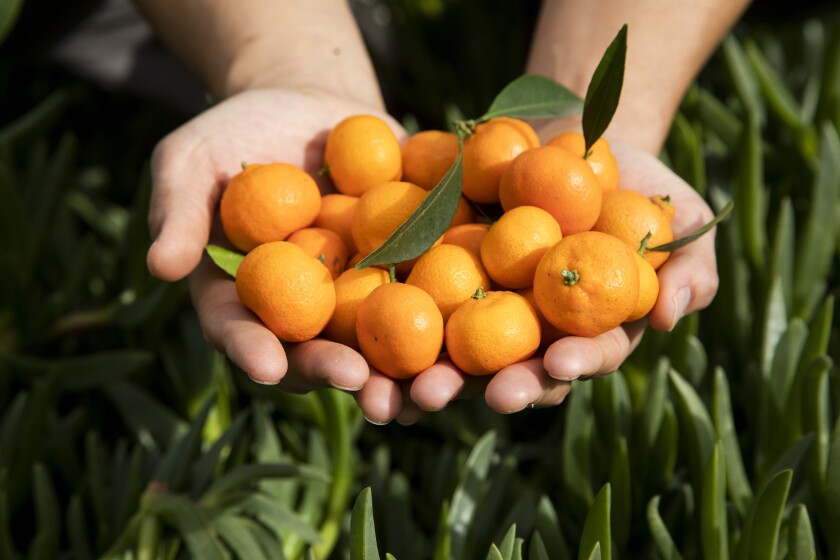Kishu ice cream from Mandarin Man and Awan adds a sweet note to Lunar New Year
Bruce Xiao trudged ahead of me in his Kishu mandarin orange groves carrying a tiny Chihuahua in one arm. The Kishu, a rare and exceptionally sweet fruit, has a narrow harvest window that typically coincides with the Lunar New Year. As we paused among the trees in his Chino Hills orchard, he picked several from a low branch. The fruit is just as promised: it has a beautiful floral scent, and when I eat a sliver of it, the sun warms my face as the citrus warms my throat.
“The Chinese word for ‘orange’ and ‘luck’ have the same sound,” Xiao said. “During the holiday season Chinese people keep oranges in their houses because they hope it will make them lucky.”
Xiao’s brilliant orange fruit has been making its way to chefs’ kitchens throughout L.A. The buzz has been amplified by his son Philip, who is never found without a stash of the fruit in his trunk or luggage. Largely due to his efforts, the Kishu is showing up this month — just in time for Lunar New Year — at specialty ice cream shop Awan in West Hollywood under the moniker the Mandarin Man, which is also the name of the Xiao family business.
Xiao’s relationship to farming is complex; he was sent to the countryside during the Cultural Revolution in China for reeducation through agrarian labor. The Cultural Revolution was a campaign of communist leader Mao Zedong to purge the country of capitalist influence, with millions persecuted or killed. Yet Xiao said he found some meaning in the simplicity of farming.
“Here’s the thing, you just have to find a way out,” Xiao said. “It’s the same thing right now; [in the U.S.] the country is split, people have different opinions and blame each other, but what can you do? You just have to do your part and do the right thing and live with it. I think that’s the only way.”
After the Cultural Revolution ended with Mao’s death in 1976, Xiao, now 64, earned a scholarship to study in the U.S. Eventually, he settled in Chino Hills with his wife in 1997, purchasing 2 acres of land. When deciding what to plant, he remembered eating mandarins with his wife in China during the Lunar New Year and planted 100 saplings in the backyard. The farm now produces 20,000 pounds of fruit annually, all of it picked by father and son.
With the onset of the COVID-19 pandemic, Philip, 28, returned home to Chino Hills to be near family. He and his father have been spending more time together than ever before. (Xiao is a somewhat hermetic figure, and despite our best efforts, he declined to be photographed for this story.)
“I learn a lot from Philip,” Xiao said. “With young people the thinking is totally different. For example, with the mandarin he thinks much broader. The mandarin can bring people together and I never thought about it that way.”

Philip Xiao helps his father Bruce Xiao tend to their Kishu mandarin orchard.
(Myung J. Chun/Los Angeles Times)
Though Xiao may spend most of his days tending to the farm and keeping to himself, Philip is making inroads in Southern California as an ambassador for the Kishu. He cultivates what he calls a “communitree,” a network of folks who celebrate and purchase the fruit. Friends have been connecting him with chefs in L.A. who are cooking with the Kishu, including Mei Lin of Nightshade and Daybird.
A box of fruit was dropped off to her in 2018, and she has been an advocate of the Mandarin Man ever since. “They don’t last at my house. Once you pop, you can’t stop,” Lin said.
She has shared the fruit with family, chef friends, and will be serving it in a Lunar New Year party. One of those chef friends is Zen Ong, the chef-owner of Awan. He recalls a missed late-night call from Lin, with staccato texts about the fruit, and 30 minutes later, she showed up at his door with a case.
“I remember having some that night and the next day and I’m like, they’re good, they’re really good,” Ong said. “The right amount of acidity, the right amount of sweetness, no seeds, and you can eat [it] in one bite — or at least that’s how I do it.”
Ong, who is Chinese Indonesian, is collaborating with the Mandarin Man farm to release a limited-edition Kishu ice cream flavor for the Lunar New Year.
In his production kitchen, Ong demonstrated how he preps the fruit, zesting the rind and using the entire fruit, stem and leaves in the ice cream base, in a nod toward sustainability that Awan is built on.
We chatted for hours in his kitchen until the mixture — a vibrant yellow-orange — was poured in a Carpigiani machine, which he calls the Ferrari of ice cream makers. Then it was time for a taste test. The coconut base gives the ice cream a rich, creamy flavor but then steps aside to the citrus of the Kishu.
On a recent night, Philip delivered Kishus to chefs, friends and customers, driving to Silver Lake, downtown, Brentwood, Santa Monica and Culver City.

The Kishu is grown in only a few orchards in California and Florida.
(Myung J. Chun/Los Angeles Times)
During the three-hour car ride, as smooth R&B by Emotional Oranges played, Philip talked about how he went from a multicultural community in Southern California to Minnesota for college, where he was one of the few Asian American students. He spoke about what it means to be Asian American in the U.S.
“I don’t have any answers, I just have more questions. I think it really makes you ask what it’s like to be Chinese and American. I think there’s a lot of people in my position in the States, with Chinese culture and Chinese heritage. I hope that’s the process of building the Mandarin Man, maybe I unearth some of those answers.”
During the drive, Philip mentioned that he hopes to harness the power of blockchain to support his father in the next chapter of his life. He plans to sell fractional shares of 50 trees on the farm and issue 500 NFTs, or non-fungible tokens. Owners of the NFTs will get two boxes of Kishus delivered to their door anywhere in the continental U.S. and an invite to a dinner hosted by the Mandarin Man at the farm. They’ve pre-sold 25 tokens without the price being set, but they are not yet for sale to the general public.
“I’m building a community of people who enjoy these Kishu mandarins, all the people who’ve enjoyed them over the last decade. I want them to be part of it, which means owning the trees.”
Though the Mandarin Man might be “jumping on the NFT bandwagon,” the appeal of the family farm has staying power. This new venture is a gesture of love from Philip, a story of multigenerational care, and a desire to provide for his father the same way he has provided for him. Philip hopes to create a new legacy, with pathways unimagined when the oranges were originally planted.
Back at the farm, I asked Xiao how the family will celebrate the Lunar New Year this year. He said they don’t have big plans. “We think every day is a holiday if you enjoy life.”
For all the latest Life Style News Click Here
For the latest news and updates, follow us on Google News.
